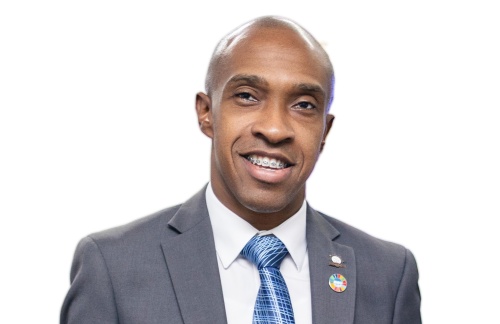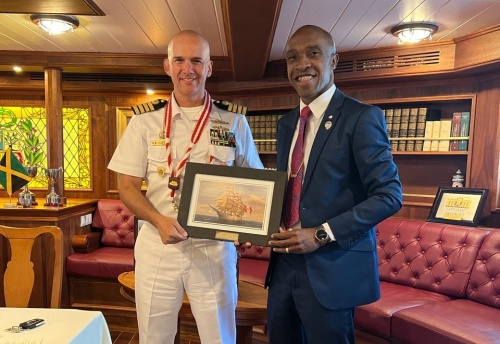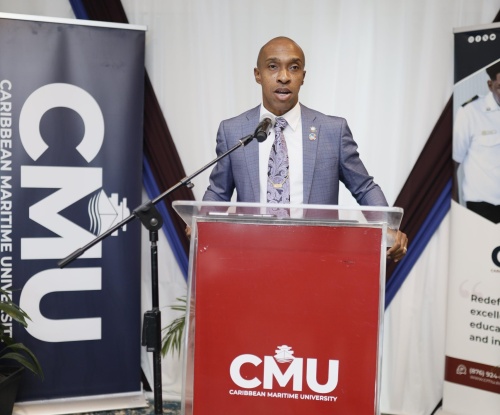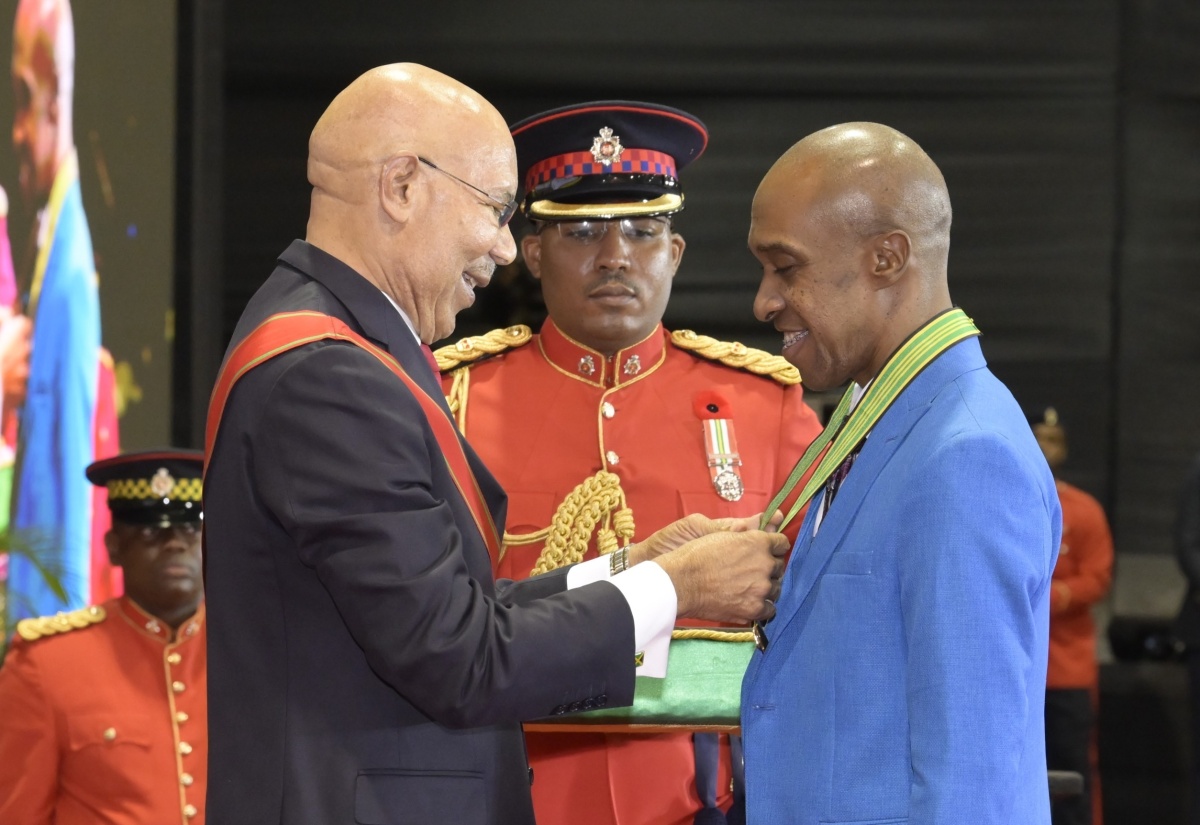Professor Andrew Spencer: Shaping Education, Policy and Maritime Innovation
By: , August 30, 2025The Full Story
In a career that spans academia, government, and corporate boardrooms, Professor Andrew Spencer, CD, has consistently chosen purpose over prestige.
His journey—defined by bold decisions, principled leadership, and an unwavering dedication to national development—has propelled him to the helm of one of the region’s premier tertiary institutions – the Caribbean Maritime University (CMU).
At just 44, Professor Spencer serves not only as CMU President, but also Chairman of the National Insurance Fund (NIF) and the National Education Trust (NET), while holding board appointments across several strategic public and private sector entities.

In 2005, after earning a Master’s degree in Tourism in the Bahamas, he returned to Jamaica with a clear mission: to build a career that shaped tourism through policy.
He joined the University of the West Indies (UWI) as a programme coordinator, and by 2007, had transitioned into full-time lecturing.
But in academia, credentials matter. Professor Spencer needed a terminal degree. He turned to then Principal of the UWI Mona Campus, Professor Gordon Shirley, who—despite the absence of official funding—extended a zero per cent interest loan.
That act of faith propelled him to Bournemouth University in the United Kingdom (UK), where he studied under world-renowned tourism and technology scholar, Professor Dimitrios Buhalis.
“Immediately after completing my thesis, we began publishing together,” Professor Spencer tells JIS News. He now boasts over 50 publications, including seven books, making him one of the most published tourism scholars in the region.
Upon returning to Jamaica in 2012 with his PhD in Tourism Strategy, Professor Spencer became the first and only holder of a tourism PhD at the UWI at the time. Less than a year later, he was appointed Director of the UWI School of Hospitality and Tourism Management in The Bahamas.
“It was surreal. Ten years prior, I sat in those classrooms.. now, I was running the school,” he beams.
Over a four-year period, Professor Spencer led a transformative agenda—enhancing the institution’s academic profile, driving enrolment growth, and sustaining its competitive edge amid rising challenges from the newly established University of the Bahamas.
In 2016, he came across a posting for Executive Director of the Tourism Product Development Company (TPDCo). The moment felt serendipitous for him, as he recalls applying to the TPDCo back in 2005 for a Product Quality Officer role, only to be turned down for requesting “too much money.” Now, more than a decade later, the top job was on offer.
In March 2017, Professor Spencer returned home—this time at the helm of the TPDCo, accepting the role at just 60 percent of his previous salary at the UWI. He maintains that “it was never about the money… it was about the impact.”
As the newly appointed Executive Director, he stepped into a somewhat polarised organisation marked by a balance of wisdom and youth.
His mandate, as he recalls, was to merge cultures, inspire trust, and modernise the agency’s public image.

Under his leadership, TPDCo redefined its public identity from enforcer to facilitator.
Other notable achievements marking Professor Spencer’s stewardship at the entity and its wider engagements include: playing a key role in shaping Jamaica’s COVID-19 tourism protocols—endorsed by the World Travel and Tourism Council; spearheading the development of the Resilient Corridor, which enabled Jamaica to reopen its tourism sector ahead of most countries; developing the Community Tourism Toolkit, later adopted by the Caribbean Tourism Organization (CTO); and repurposing staff into COVID-19 response officers, preserving jobs while supporting the national recovery effort.
In 2020, following a transformative tenure at TPDCo, he returned to the UWI to fulfil a personal goal: attaining the rank of full professor. He was appointed Deputy Executive Director at the Mona School of Business and Management, where he oversaw the Mona campus’ largest undergraduate programme.
He was promoted to Professor of Tourism in November 2021, becoming the first in the field across the entire Caribbean and one of the youngest individuals ever to attain the rank at the UWI.
Professor Spencer says shortly after his promotion, he received offers to lead two tertiary institutions: the University of Technology, Jamaica, and the CMU, describing the latter as a “natural fit.”
“CMU blends academia with industry. It’s a university that operates like a corporation, which fits my hybrid background perfectly,” he tells JIS News.
In 2022, he was appointed CMU President, bringing with him a blend of strategic leadership, corporate insight, and a deep academic ethos.

Professor Spencer’s appointment marked a new chapter for the institution, following a period of transition and reform.
His impact has been swift and visible. In the area of research output, CMU rose from sixth to third in national rankings for research citations per faculty.
In terms of international partnerships, Professor Spencer was instrumental in formalising Memoranda of Understanding with Carnival and Royal Caribbean Cruise Lines—introducing cruise sector relationships to the CMU.
The President has also been instrumental in securing a £150,000 grant focused on sargassum research and leading a project on decarbonising the maritime industry in collaboration with the International Maritime Organization (IMO).
As Chairman of the National Insurance Fund (NIF), he is leading a strategic transformation—doubling investment returns from four per cent to nearly eight per cent, while implementing forward-looking strategies to safeguard the Fund’s long-term sustainability.
“My parents were poor and retired with NIS benefits. I’m safeguarding that promise for others,” he states emphatically As National Education Trust (NET) Chairman, Professor Spencer is focused on building resilient, equitable, and “tech-forward” schools for Jamaica’s youth. Through these three institutions, his service spans the full lifecycle of education for youth, training and job access for working-age Jamaicans, and security for retirees.
Professor Spencer sees his career, not merely in years or titles, but in time lost and time redeemed.
“I repeated fourth form and became the oldest boy in my class at Wolmer’s Boys School. Now, I’m often the youngest in the rooms I lead,” he reflects.
At 33, Professor Spencer led the UWI Bahamas Campus; at 35, he was appointed Senior Lecturer; at 37, he took the helm of TPDCo; at 41, he became the Caribbean’s first Professor of Tourism; at 42, President of the Caribbean Maritime University; and now, at 44, he chairs two major Government Boards.
Professor Shirley who now serves as Port Authority of Jamaica (PAJ) President and Chief Executive Officer, expresses pride in his role in shaping a young leader.
“When Professor Spencer approached me in 2009 for financial assistance to pursue a PhD in the UK, it was clear to me that he was promising. I recall referring to him then as ‘Young Spencer’. There was a fire of determination in his eyes, and so it is no surprise to me that he has made good on that investment, completing the programme in record time and going on to lead UWI programmes in the Bahamas,” he recalls. Professor Shirley, who Chairs the CMU, acknowledges Professor Spencer’s appointment as the institution’s President, adding “I am proud of his achievements and look forward to what lies ahead.”
As the institution grows, so does its impact. Under Professor Spencer’s leadership, the university is rapidly emerging as the training ground of choice for high-demand, high-impact maritime careers across the Caribbean. “We are a region surrounded by water, and approximately 95 percent of what we consume comes by sea. We need seafarers, engineers, customs officers, and port managers, and CMU trains them all,” the President states. Director of Graduate Studies and Research at the institution and President of the Women in Maritime Association Caribbean (WiMAC), Dr. Evett Smith-Johnson, describes her boss as a transformational leader who is growth-oriented and people-centric.
“[He] is passionate about making the best strides in the present while focused on building capacity for a better university. This is illustrated in initiatives such as introducing an Academic Promotion Policy and putting the relevant procedures in place to operationalise it,” she explains.
Under Professor Spencer’s leadership, CMU is expanding its reach, elevating research, and preparing a new generation for the global stage. His mission, however, remains deeply personal.
“If I can touch every demographic – students, workers, retirees – then I’ve done my part in building this nation,” he proudly declares. If history is a guide, Professor Andrew Spencer’s best chapters are still to come, as he continues to solidify his legacy.




